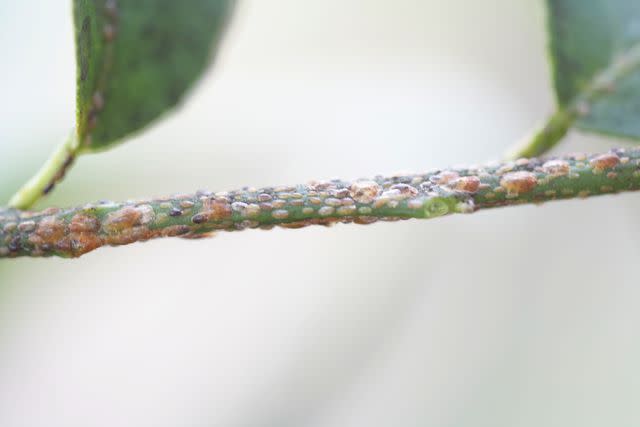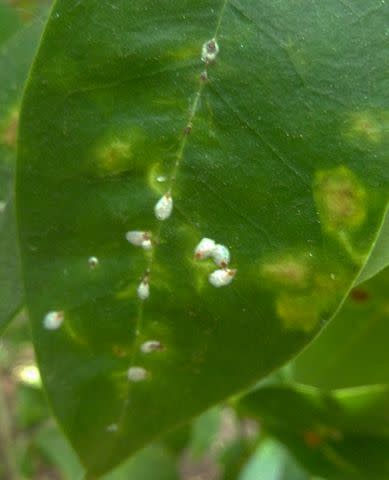How to Get Rid of Scale on Plants in Your Home and Garden
These organic pest control tips will help you get rid of scale on your plants, plus prevent them from returning.
Scale insects are often overlooked in indoor and outdoor gardens due to their small size and natural camouflage. These plant pests may not look like much, but scale can cause a lot of headaches for plant parents and they’re some of the trickiest pests to eradicate. However, there are effective ways to get rid of scale on plants once and for all. In this guide, you’ll find everything you need to know to identify, treat, and prevent scale insects using natural and organic gardening methods.

Jason Donnelly
What Are Scale Insects?
There are about 8000 different species of scale insects, typically divided into two main categories: soft-bodied scale, which includes mealybugs, and hard-bodied or armored scale. Most types of scale are specialist feeders and they target specific plant species. Fruit trees are often favored by scale, but these pests also attack hollies, camellias, and houseplants like crotons and monsteras.
Soft-bodied scale insects are a bit larger than hard-bodied scale, but both types of scale typically measure about 1/8 to 1/16 inches long. Soft-bodied scale sometimes look fluffy, like tiny white cotton balls, while hard-bodied scale have waxy, domed shells that protect their delicate bodies. Scales come in an assortment of colors, including white, gray, brown, tan, and yellow, and their muted tones help them blend into plant leaves and stems.
Compared to other bugs, scale don’t move far and most species are stationary as adults. However, during their nymph or crawler stage, scale insects can move between plants, which is particularly problematic if the pests invade houseplant collections.

Identifying a Scale Infestation
Because scale insects are so small, many gardeners don’t realize that they’re dealing with a scale problem until infestations spread so much that they're obvious. Often, scale insects are confused with the natural bumps that appear on the stems of certain plants. However, unlike natural plant bumps, scale can be easily scraped off plant leaves with your fingernails.
In general, scale insects target plant leaves and stems, but they often congregate on the undersides of plant leaves and around plant leaf veins. Be sure to check these areas carefully if you suspect scale have invaded your plants and be on the lookout for sticky “honeydew,” which soft-bodied scale release as they feed. As infestations progress, you may also notice signs of stress in affected plants, such as leaf discoloration, leaf drop, and stunted growth.
Related: What's Wrong with My Plant? How to Fix 10 Houseplant Problems
How to Get Rid of Scale Insects
Scale insects reproduce rapidly and they spread quickly during their crawler phase, so it’s important to act fast if you spot scale on your plants.
Scale on Houseplants
If you see scale on your houseplants, isolate the infected plants immediately and prune away any leaves that are badly infested with scale. Small infestations of scale can be treated by dipping a cotton swab in rubbing alcohol and dabbing the alcohol over any scale you see. However, if you have a large infestation of scale, you’ll have better luck treating plants with an organic insecticidal spray.
Soap sprays and neem oil sprays usually work well for mealybugs and other soft-bodied scales, but organic horticultural oil sprays work better for armored scale. Sprays should be applied every 7 to 10 days until all signs of scale have vanished and you’ll want to apply sprays in the evening so plants don’t develop sunburn.
Scale on Fruit Trees or Outdoor Plants
If scale have invaded your fruit trees or outdoor garden, you have several options. One option is to release beneficial insects, such as predatory wasps, ladybugs, and lacewings, near affected plants. These predatory insects naturally feed on scale and they can make short work of these pests.
Another option is to treat affected plants with organic horticultural oil sprays. These products should be applied when plants are dormant in winter, or in late winter to early summer when scale nymphs are most active.
How to Prevent Scale Insects
While scale insects can be removed using natural treatment methods, it’s much easier to prevent scale from invading your plants in the first place.
Most of the time, scale invade houseplant collections by hitching a ride on new plants you bring home. To avoid this, always check plants over carefully and quarantine new arrivals for several weeks before you add them to your collection. Houseplants can also sometimes be infected with scale if they’re kept outside during the summer, so you may want to spray your plants preventatively with horticultural oil before bringing them back indoors.
In outdoor gardens, scale insects can be kept at bay with companion planting. Growing strongly scented herbs as well as flowers in the Umbellifer family (such as parsley, dill, and Queen Anne’s lace) near plants that are favored by scale insects can attract ladybugs, lacewings, and other insects that feed on scale. It’s also good practice to keep plants as healthy as possible by providing them with a proper balance of water, fertilizer, and sunlight. Happy plants can naturally resist many plant diseases and pests, including scale.
Frequently Asked Questions
Why are scale insects difficult to control?
Scale insects are covered in a thick, waxy coating, which makes them resistant to some pesticides. Hard-bodied scale are particularly well armored, but even these pests are vulnerable to horticultural oil and rubbing alcohol.
Does vinegar get rid of scale on plants?
Vinegar sprays can sometimes work on soft-bodied scale, but they aren’t effective against armored scale insects. If you choose to use vinegar sprays, be sure to dilute the vinegar with water and add a few drops of Castile soap to help the mixture adhere to plant leaves.
Does scale live in soil?
Scale insects don’t live in soil, but nymphs can sometimes crawl around soil as they look for a place to feed. If you’re struggling with a bad infestation of scale on your houseplants, you may want to repot your plants in fresh soil or spray a bit of horticultural oil on the soil line to keep scale nymphs from spreading.
For more Better Homes & Gardens news, make sure to sign up for our newsletter!
Read the original article on Better Homes & Gardens.

